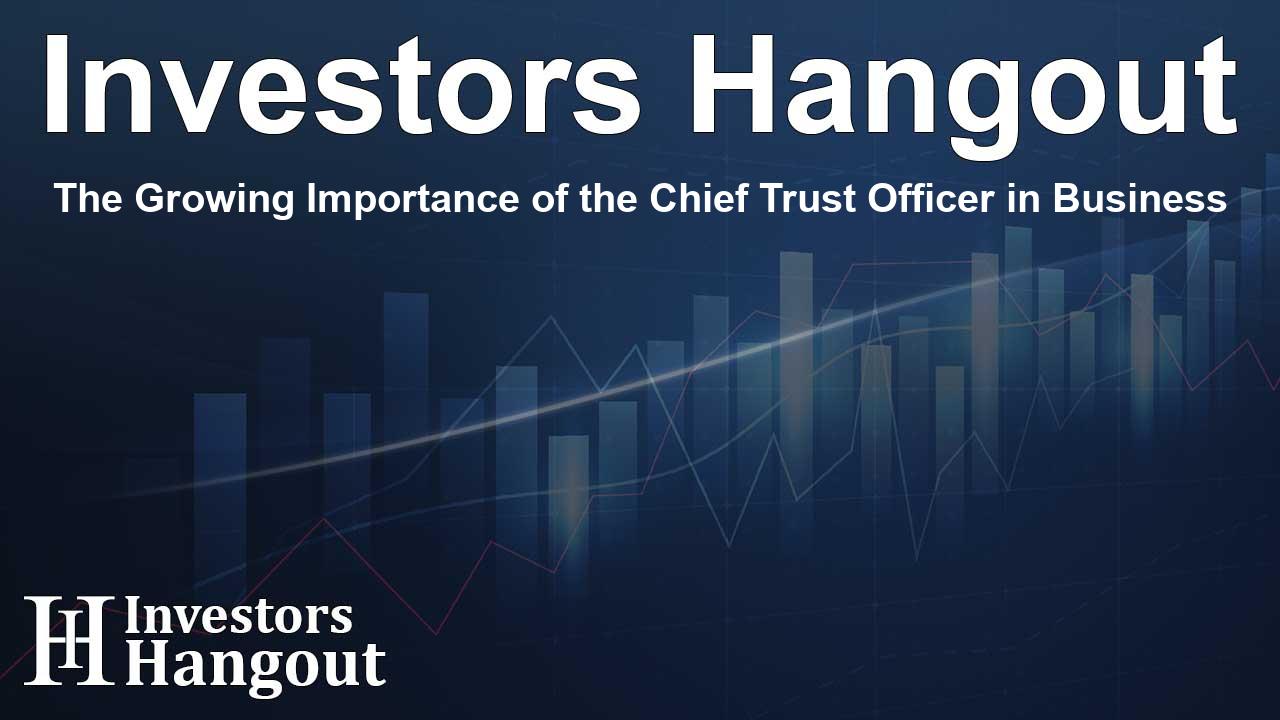The Growing Importance of the Chief Trust Officer in Business

The Chief Trust Officer: A New Essential Role in Businesses
97% of UK organizations believe the Chief Trust Officer is essential as challenges with AI, cybersecurity, and data continue to rise.
Recent studies indicate that a significant number of business leaders in the UK advocate for integrating a Chief Trust Officer (CTrO) into their executive teams. This position is gaining urgency as companies grapple with protecting their reputation and fostering trust among stakeholders, particularly in this era of rapid technological and security changes. The findings show that the complexities of modern business demand such a role to streamline accountability and enhance customer trust.
A notable percentage of executives reported that no single person is currently responsible for overseeing trust-related issues, which are often distributed among Chief Operating Officers (COOs), Chief Information Security Officers (CISOs), and Chief Information Officers (CIOs). The fragmented approach has led to calls for consolidation under a single role that can manage trust, data security, and regulatory compliance holistically.
The Role of Trust in Modern Business
The significance of trust has never been more poignant in today's business landscape. A recent report highlighted that many organizations are recognizing an urgent demand for enhanced defensive measures and resilience capabilities. Trust in data and technology is becoming increasingly critical as breaches can lead not only to financial losses but also to long-term damage to reputation.
“Resilience is a key strategic focus for global enterprises today. A decade ago, a data breach was merely a technical glitch. Now, it can escalate into a crisis that impacts brand reputation, investor confidence, and even careers,” explained Danielle Sheer, Chief Trust Officer at Commvault. This evolving narrative around trust is vital for businesses striving to meet customer expectations.
Key Priorities for Chief Trust Officers
When discussing the priorities for a CTrO, business leaders highlighted several critical areas. The highest priorities included managing customer trust and reputation (31%) and ensuring rapid crisis response in times of disruption, such as data breaches or misinformation (30%). These priorities underscore the extensive and varied nature of digital trust and its implications for business strategy.
To effectively address these priorities, businesses identified essential skills for the role, such as:
- In-depth understanding of data privacy and relevant regulatory frameworks (28%)
- Expertise in AI governance and the ability to simplify emerging technologies for diverse audiences (27%)
- Capability to build and maintain stakeholder trust consistently (27%)
Increased Demand Amid Growing Threats
A significant observation from the research, which surveyed 1,000 C-Suite leaders from companies with over £100 million in revenue, revealed that 97% of respondents acknowledge the pressing need for a CTrO to enhance trust in data management, technology utilization, and governance practice. The external challenges driving this demand are growing AI capabilities (37%), stringent cross-border regulations (34%), and the persistent threat of cybersecurity incidents such as ransomware attacks (34%).
Methodology Behind the Research
The survey was conducted independent of any specific interests and exclusively for Commvault. It gathered insights from a diverse group of business leaders, including roles such as CEOs, COOs, CFOs, CTOs, CIOs, CISOs, and others, collectively representing a wide spectrum of executive responsibilities within large organizations.
As data privacy concerns rise and technological threats become more sophisticated, the role of a Chief Trust Officer may well prove indispensable in shaping the future of secure and resilient business practices.
About Commvault
Commvault (NASDAQ: CVLT) is recognized as the benchmark for cyber resilience, assisting over 100,000 organizations in maintaining data safety and operational continuity. The company provides a comprehensive cyber resilience platform that integrates top-notch data security with rapid recovery solutions, ensuring effective management of data across various workloads globally, while delivering value at a competitive total cost of ownership.
Frequently Asked Questions
1. What does a Chief Trust Officer do?
A Chief Trust Officer oversees trust-related issues within a company, including data security, privacy, and regulatory compliance, ensuring stakeholder confidence and brand integrity.
2. Why is the Chief Trust Officer becoming a crucial role?
With increasing threats from cybersecurity breaches and the complexities of data management, the CTrO is essential for maintaining trust and protecting a company's reputation.
3. What are the top skills needed for a CTrO?
A CTrO should have expertise in data privacy, knowledge of AI governance, and strong abilities in building stakeholder trust.
4. How do companies benefit from having a Chief Trust Officer?
Having a CTrO can lead to improved trust in data management and technology, enhanced crisis response, and better alignment of trust with overall business strategy.
5. What recent challenges highlight the need for a Chief Trust Officer?
Recent challenges such as rising AI threats, cross-border data regulations, and persistent cybersecurity incidents have emphasized the need for a dedicated role focused on trust management.
About The Author
Contact Ryan Hughes privately here. Or send an email with ATTN: Ryan Hughes as the subject to contact@investorshangout.com.
About Investors Hangout
Investors Hangout is a leading online stock forum for financial discussion and learning, offering a wide range of free tools and resources. It draws in traders of all levels, who exchange market knowledge, investigate trading tactics, and keep an eye on industry developments in real time. Featuring financial articles, stock message boards, quotes, charts, company profiles, and live news updates. Through cooperative learning and a wealth of informational resources, it helps users from novices creating their first portfolios to experts honing their techniques. Join Investors Hangout today: https://investorshangout.com/
The content of this article is based on factual, publicly available information and does not represent legal, financial, or investment advice. Investors Hangout does not offer financial advice, and the author is not a licensed financial advisor. Consult a qualified advisor before making any financial or investment decisions based on this article. This article should not be considered advice to purchase, sell, or hold any securities or other investments. If any of the material provided here is inaccurate, please contact us for corrections.
